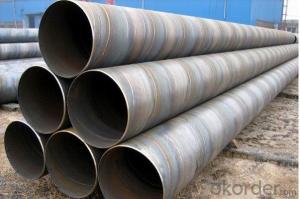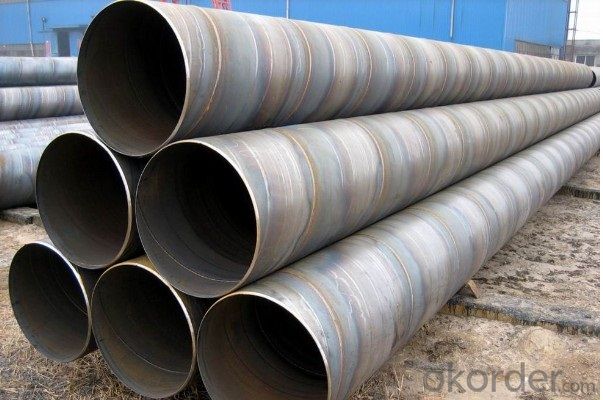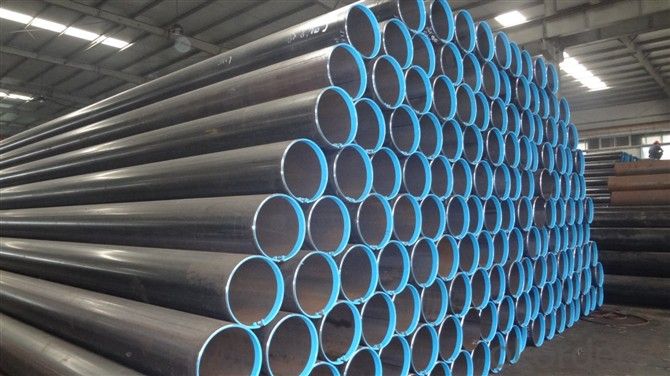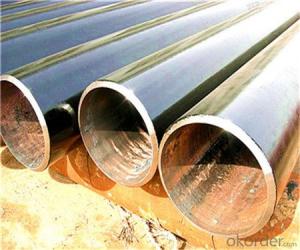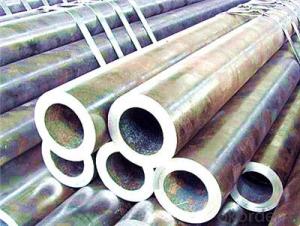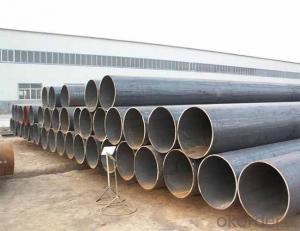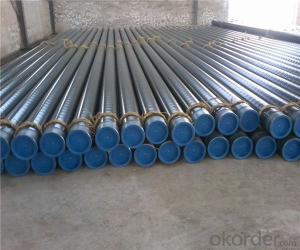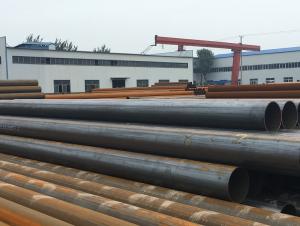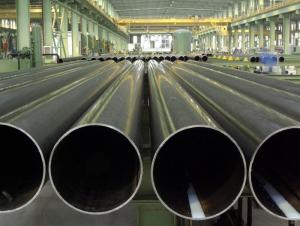Welded Steel Pipe -- China Top Supplier
- Loading Port:
- Tianjin
- Payment Terms:
- TT OR LC
- Min Order Qty:
- 25 m.t.
- Supply Capability:
- 7000 m.t./month
OKorder Service Pledge
OKorder Financial Service
You Might Also Like
1、Structure of Welded Steel Pipe AL53:
Welded Steel Pipe is formed by drawing a solid billet over a piercing rod to create the hollow shell. As the manufacturing process does not include any welding, and we can provide you any size and any type of pipes you want, and the most important is we can sure the quality of production.
2、Main Features of the Welded Steel Pipe ASTM AL53:
• High manufacturing accuracy
• Harder and Powerful strength
• Have small inertia resistance
• Strong heat dissipation ability
• Good visual effection
• Reasonable price
3、Seamless Pipe ASTM A106/53 Specification:
Standard | GB, DIN, ASTM ASTM A106-2006, ASTM A53-2007 |
Grade | 10#-45#, 16Mn 10#, 20#, 45#, 16Mn |
Thickness | 8 - 33 mm |
Section Shape | Round |
Outer Diameter | 133 - 219 mm |
Place of Origin | Shandong, China (Mainland) |
Secondary Or Not | Non-secondary |
Application | Hydraulic Pipe |
Technique | Cold Drawn |
Certification | API |
Surface Treatment | factory state or painted black |
Special Pipe | API Pipe |
Alloy Or Not | Non-alloy |
Length | 5-12M |
Outer Diameter | 21.3-610mm |
Grade | 20#, 45#, Q345, API J55, API K55, API L80, API N80, API P110, A53B |
Standard | ASME, ASTM |
1) Material:20#(ASTM A 106/A53 GRB.API5LGRB,GB),45#,16Mn,10#.
2) Specification range:OD:21.3-610mm,WT:6-70mm,length:6-12m or according to the requirement of clients.
3) Excutive standards:GB,ASME API5L.ASTM A 106/A53,Despite of the above standards,we can also supply seamless steel pipe with standard of DIN,JIS,and so on,and also develop new products according to the requirements of our clients!
4) Surface:black lacquered,varnish coating or galvanized.
5) Ends:Beveled or square cut,plastic capped,painted.
6) Packing:bundles wrapped with strong steel strip,seaworthy packing.
4、Packaging & Delivery
Packaging Details: | seaworthy package,bundles wrapped with strong steel strip |
Delivery Detail: | 15-30days after received 30%TT |
5、FAQ of Seamless Pipe ASTM AL53:
①How is the quality of your products?
Our products are manufactured strictly according to national and internaional standard, and we take a test
on every pipe before delivered out. If you want see our quality certifications and all kinds of testing report, please just ask us for it.
Guaranteed: If products’ quality don’t accord to discription as we give or the promise before you place order, we promise 100% refund.
②How about price?
Yes, we are factory and be able to give you lowest price below market one, and we have a policy that “ for saving time and absolutely honest business attitude, we quote as lowest as possible for any customer, and discount can be given according to quantity”,if you like bargain and factory price is not low enough as you think, just don’t waste your time.Please trust the quotation we would give you, it is professional one.
③Why should you chose us?
We have many years experience for this area of business and we aboselutely have become an professional company in this area, what we can provide you is professional service.
6、Seamless Pipe ASTM AL53 Images:
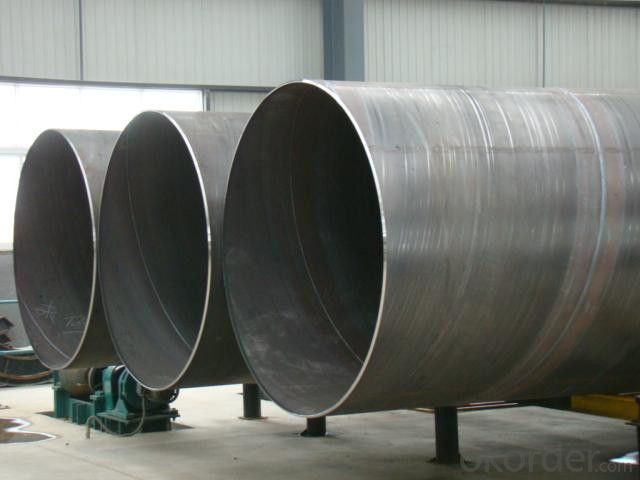
- Q: How are steel pipes used in the agricultural irrigation systems?
- Steel pipes are commonly used in agricultural irrigation systems to transport water from a water source, such as a well or reservoir, to the fields. They are durable and can withstand high pressure, making them suitable for long-distance water transportation. Steel pipes are also resistant to corrosion and can withstand various weather conditions, ensuring reliable and efficient water distribution for crop irrigation.
- Q: How are steel pipes used in the manufacturing industry?
- Steel pipes are used in the manufacturing industry for a wide range of applications, including the transportation of fluids and gases, structural support in buildings and infrastructure, and as a material for heat exchangers and boilers. They are also utilized in the production of various machinery and equipment, such as conveyors, cranes, and industrial piping systems. Overall, steel pipes play a crucial role in ensuring efficient and reliable operations across numerous manufacturing processes.
- Q: How do steel pipes perform in extreme temperature variations?
- Steel pipes are designed to perform well in extreme temperature variations. Due to their high tensile strength and thermal conductivity, steel pipes can withstand both high and low temperatures without significant changes in their structural integrity. However, it is important to note that extreme temperature variations may cause slight expansion or contraction of the steel pipes, which could potentially lead to minor changes in their dimensions.
- Q: How are steel pipes insulated to prevent heat gain?
- Steel pipes are typically insulated using materials such as fiberglass, foam, or mineral wool. These insulation materials are wrapped around the steel pipes to create a barrier that reduces heat transfer. The insulation helps to prevent heat gain by minimizing thermal conductivity and keeping the temperature of the pipes stable, which is crucial for maintaining the integrity and efficiency of various industrial processes.
- Q: How are steel pipes used in the manufacturing of food and beverage processing plants?
- Steel pipes are commonly used in food and beverage processing plants for various purposes such as transporting liquids, gases, and steam. They are used to create a network of pipelines that facilitate the movement of raw materials, ingredients, and finished products throughout the manufacturing process. Steel pipes are chosen for their durability, corrosion resistance, and ability to withstand high pressure and temperature conditions, ensuring the safety and efficiency of food and beverage production.
- Q: Can steel pipes be used for geothermal systems?
- Yes, steel pipes can be used for geothermal systems. Steel is a commonly used material for geothermal applications due to its durability, strength, and resistance to corrosion. It can effectively withstand the high temperatures and pressures associated with geothermal systems, making it a suitable choice for transporting the geothermal fluid to and from the heat source.
- Q: How are steel pipes specified in engineering drawings?
- Steel pipes are specified in engineering drawings by providing information such as the diameter, thickness, material grade, length, and any additional specifications or requirements such as the type of coating or threading needed.
- Q: How are steel pipes connected to other materials like concrete or plastic?
- Steel pipes are commonly connected to other materials like concrete or plastic through various methods. One common method is through the use of fittings. Fittings are specialized components that facilitate the connection between different materials or pipe sections. These fittings come in various shapes and sizes, such as elbows, tees, reducers, and couplings, and they are designed to provide a secure and leak-proof connection. When connecting steel pipes to concrete, one method is to use concrete anchors. These anchors are embedded into the concrete structure and provide a stable base for securing the steel pipe. The pipe is then attached to the anchor using clamps or brackets. Connecting steel pipes to plastic materials can be achieved through the use of transition fittings. These fittings are specifically designed to join steel pipes with plastic pipes. They typically feature different connection mechanisms on each end, such as threads or compression fittings, allowing for a secure and reliable connection. In some cases, steel pipes can also be connected to other materials using welding techniques. Welding involves melting the ends of the steel and the other material together to create a strong joint. This method is often used for connecting steel pipes to steel structures or components. Overall, the connection of steel pipes to other materials like concrete or plastic requires the use of specialized fittings, anchors, or welding techniques. These methods ensure that the connection is secure, durable, and able to withstand the demands of the application.
- Q: How are steel pipes used in bridge construction?
- Steel pipes are commonly used in bridge construction for various purposes. They are often used as piles to provide structural support to the bridge foundation, ensuring stability against soil movement and water pressure. Additionally, steel pipes are used as structural components in the bridge's superstructure, such as for trusses and beams, due to their high strength and durability. Steel pipes also play a crucial role in carrying utilities, such as water and gas pipelines, across the bridge. Overall, steel pipes are an essential element in bridge construction, providing strength, stability, and functionality to the structure.
- Q: How are steel pipes used in the manufacturing of power distribution systems?
- Steel pipes are commonly used in the manufacturing of power distribution systems as they provide a reliable and durable solution for transporting and protecting electrical cables. They are used to create conduits that house the cables, ensuring safe and efficient transmission of electricity throughout the system. Steel pipes also offer resistance to corrosion, fire, and extreme weather conditions, making them a suitable choice for power distribution systems.
Send your message to us
Welded Steel Pipe -- China Top Supplier
- Loading Port:
- Tianjin
- Payment Terms:
- TT OR LC
- Min Order Qty:
- 25 m.t.
- Supply Capability:
- 7000 m.t./month
OKorder Service Pledge
OKorder Financial Service
Similar products
Hot products
Hot Searches
Related keywords
